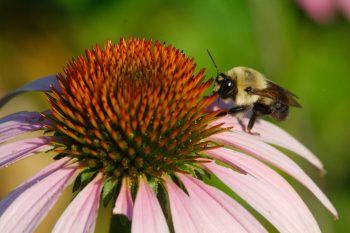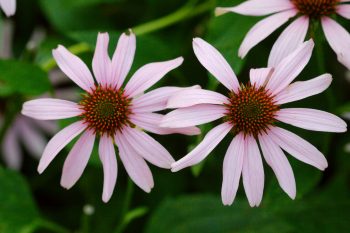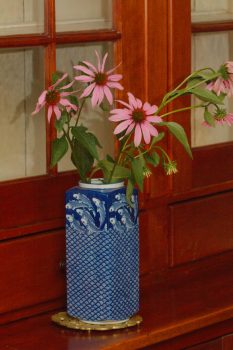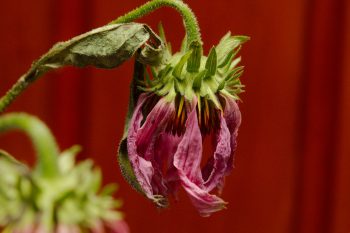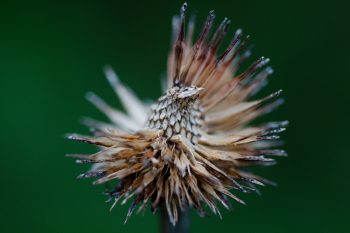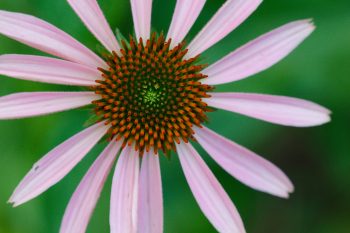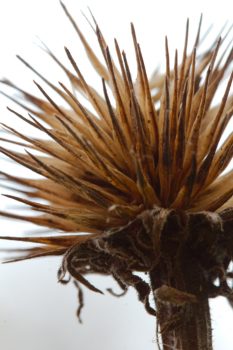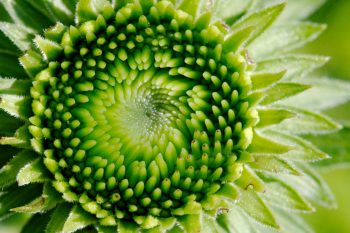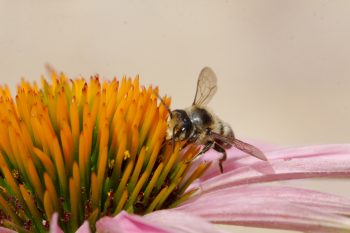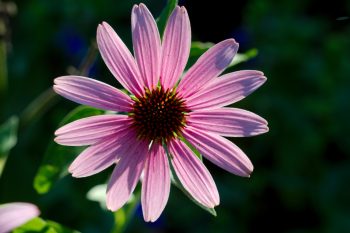The coneflowers (Echinacea purpurea) in our yard tend to get eaten up by insects of one sort or another. I’m not sure who the culprit actually is, but they eat holes in the ray florets (the petals around the central group of disc florets), making the flowers a bit less attractive for photography. The bees aren’t bothered, of course, and this bumble bee (Bombus impatiens). The generic name Echinacea comes from the Greek word meaning hedgehog or sea-urchin, which references the spiny center of the flower. The name Bombus for bumble bees comes from the Latin (which took it from the Greek) for “booming, buzzing, humming.”
Tagged With: Echinacea purpurea
Bumble Bee on Coneflower
Purple Coneflower
It’s been a good year for the purple coneflower (Echinacea purpurea) in our yard. Of course, it’s been an even better year for the weeds. With most weekends at least partly devoted to dealing with one or both of our mom’s houses, we’ve spent a lot less time in the garden this year. There is bindweed (Convolvulus species) everywhere and it’s running riot. In particular, along the back fence and the garden along the south end of the house are both totally out of control. There is significant pokeweed, goldenrod, various thistles, and even a few trees (zelkova, elm, maple, and ash). But there are some blooms that were intended, as well, including this coneflower.
Purple Coneflowers
Cathy brought some coneflowers in this evening to put in a vase in or dining room. Actually, they got knocked over when she was cutting the grass so she figured we might as well enjoy them as they die. I think they look really nice against the rich brown of this china cabinet. As you might be able to tell, the china cabinet is empty. We’ll put things in it but we haven’t gotten around to it yet. For now, the things that could go in it are in boxes and taking up space that could be used in better ways. But finding them and figuring out what we want where is a bit too much for us right now.
We don’t bring flowers in very often but I’m always glad when we do. One of the nicest photos I’ve taken, actually, is a vase of flowers, mostly roses, that Cathy arranged. It was sitting on our kitchen table and the late afternoon sun was coming in and lighting it from the side so the background went fairly dark and the flowers glowed nicely. I’ve made a few prints of that one, taken in 2010, and it’s been fairly popular. I don’t think this one will win any awards but I do like the colors and it’s a relaxing picture, to me.
Wilting Coneflower
Ten days ago I posted a picture of purple coneflowers in a blue and white vase against the dark cherry of a china cabinet. I was a little surprised by the relatively warm reception it received. Those same flowers are now a little bit past their prime. This is one of them, drooping and a little faded, but still quite lovely in its own way. Of course, we all want to be the strong, beautiful flower, blooming where we are planted. But that’s fleeting, as it is written, “As for man, his days are like grass; he flourishes like a flower of the field; for the wind passes over it, and it is gone, and its place knows it no more.” (Psalm 103:15-16 ESV) But even his days are not all full bloom. We start as a small sprout (metaphorically speaking), grow, (hopefully) bloom, and (even more hopefully) bear fruit. But then we grow old and begin to fade, like this flower. That, too, can be beautiful. Lord, help me to grow old gracefully.
Purple Coneflower
The purple coneflowers (Echinacea purporea) is long since finished blooming. In fact, most things have. There are still flowers on a few plants but they are getting fewer and farther between. But that’s not the end of interest in the garden. In the fall we start to see shapes that we don’t notice in the summer amid all the color. The seeds of this coneflower are lovely in their own way, especially the way they detach and leave this little floret of spikes as they are carried off, probably by gold finches and other small birds. The gold finches, too, have lost their summer finery and are dressed in pale brown for the winter.
Coneflower
There are quite a few really amazing coneflower (Echinacea purpurea) varieties now and if I had the space and the time and the money, I’d consider a collection of the as one aspect of a large garden. They vary in color from the “standard” pinkish-purple bracts and with orange spikes, as seen here, to all sort of oranges, yellow, and darker purples. They flower shapes vary, as well, and they are all lovely. Sadly, there are enough plant-eating insects that enjoy them that they don’t often last in pristine condition. Photographing them in their prime means getting them when the flowers first open, because the bracts get holes in them almost immediately. Still, they provide color in a time when not a lot is blooming.
Echinacea purpurea
This is purple coneflower (Echinacea purpurea) although obviously there isn’t any purple color here right now. These are last year’s seeds, which we generally leave up all winter for the birds. They are obviously well fed, because by spring, most of them are still here. It’s just about time we cleared them all out. Most of the black-eyed Susan seed stalks have been cleared, although we’ve left some yet.
I was on the ground taking photos of a columbine (Aquilegia) and happened to notice this coneflower stem next to me, so I rolled over on my back and took a few shots, hoping to get a little detail in the seeds, which were seriously back-lit by the sky. This one turned out pretty well. I would have liked to get a little further away, as well, but I was looking nearly straight up and getting further away would have required that I dig a hole to get into. So, not going to happen.
Coneflower
I love patterns in nature. Some are seemingly random but others, like the swirls in this coneflower, are strikingly organized. Even the random patterns have a rhythm to them, like the meandering of a river or the branching of an oak. Patterns are all around us and it’s worth looking for them and being reminded that it isn’t all a matter of chance. I’m a firm believer is a creator who designed all that is. I don’t understand some (or even most) aspects of the design but I appreciate them, nonetheless. This is a relatively simple pattern but very satisfying, at least to me.
Resin Bee on Coneflower
I wasn’t happy with most of the pictures I took today, but this one isn’t too bad. I’m pretty sure this is a sculptured resin bee (Megachile sculpturalis), although there are a few other Megachile species it could be (e.g. the flat-tailed leaf-cutter bee, Megachile mendica, which is more common). Regardless, it’s a nice, quiet little bee and it was moving among the coneflowers, along with a few other solitary bees and an occasional honey bee (Apis mellifera). I know that some folks are not fond of bees and don’t like to have them around. With the exception of a few aggressive hornets and wasps, I like having them around. They really rarely sting unless provoked and they are quite pretty to watch on flowers.
Backlit Coneflower
The coneflower (Echinacea purpurea) is in our back garden near the back fence. In the late afternoon, backlit by the sun it’s quite lovely. The bees, particularly carpenter and bumble bees, seem to really like the coneflowers. We (and by we I mostly mean Cathy) did a lot of work in this part of the garden this summer. It had become quite overgrown with mugwort and goldenrod among the monarda, asclepias, and irises. It’s basically ready for new plants now, so it isn’t finished, but it’s so much better than it was.

